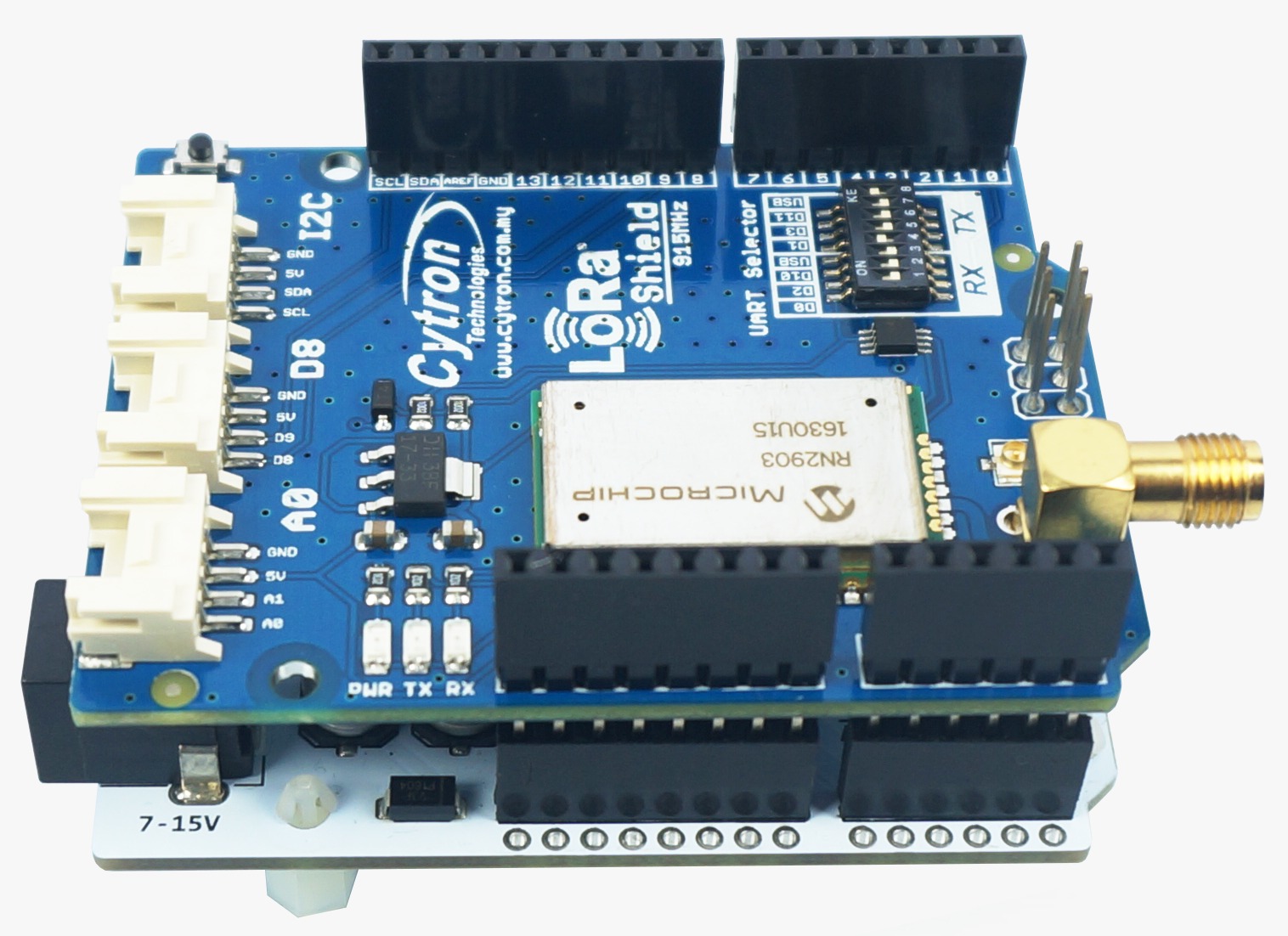IMPORTANT: Download this whole folder as zip and extract it into your preferred directory OR git clone the folder.
- Stack LoRa Shield onto CT-ARM with antenna installed as shown in picture below. Make sure UART selector on LoRa Shield is selected correctly (D2 -> RX, D3 -> TX). User can change UART depending on the program, by default we use this configuration.
CT-ARM with LoRa Shield on top
CT-ARM + LoRa Shield with antenna installed
Choose D2 as RX and D3 as TX
- Download the latest Arduino IDE at Arduino official website.
- Open Arduino IDE, go to File > Preferences, paste the following link at Additional Boards Manager URLs:
https://raw.githubusercontent.com/CytronTechnologies/Cytron-ARM-Arduino-URL/master/package_cytron_index.json - Click OK, then go to Tools > Board > Boards Manager. Find Cytron ARM Boards and click Install. It will take a few minutes.
- After the installation complete, you should find CT-ARM listed under Tools > Board. Select CT-ARM.
- Next, connect CT-ARM to your PC using Micro USB cable and proceed with FTDI driver installation (Please download the driver here). If you already using CT-UNO before, your PC should be able to detect the driver.
- Once complete, select proper COM port under Tools > Port.
- For testing purpose, open Blink example from File > Examples > 01.Basics > Blink, and upload to CT-ARM.
More detailed info here
- Download the zip file from here.
- Open Arduino IDE, go to Sketch > Include Library > Add .ZIP Library, choose the downloaded zip file and click Open.
- Open
DeviceInfoexample from File > Examples > TheThingsNetwork, and upload to CT-ARM. - Open Serial Monitor and search for DevEUI shown. Copy the DevEUI at somewhere else because we are going to use it later.
- Visit this link https://orbiwise-user-registration-bengchet.c9users.io/registration to register a new account.
- If the account is successfully registered, the webpage will redirect you to Orbiwise login page, where you can sign in with account username and password.
- Once you have login to the account, go to My Devices > List of Devices.
- Click
Add Deviceto register your LoRa device. - Choose
Personalizedas registration type. - Fill in DevEUI, AppEUI(optional), Comment(optional), DevAddr, NwkSkey and AppSKey. We can use generated keys derived from LoRa shield devEUI via https://orbiwise-user-registration-bengchet.c9users.io/generate. Copy all the generate keys at somewhere else for later use.
- At LoRa Parameters tab, register the device as
Class Adevice. - Click
Add Deviceto complete device registration.
- Open example sketch
Workshopfrom File > Examples > TheThingsNetwork. - Modify devAddr, nwkSKey and appSKey in the sketch.
- Modify the payload in the sketch (optional).
- Upload to CT-ARM.
- Open Serial Monitor to view the progress of LoRa device.
- Go to Orbiwise login page (make sure you have login), access My Devices > List of Devices.
- Choose your registered device, right-click action, choose View Data.
- If your device is sending the data properly, you should be able to view the data. Click
refreshto view any new coming data.
Node-RED allows you to create simple server applications using GUI.
More details, please refer here.